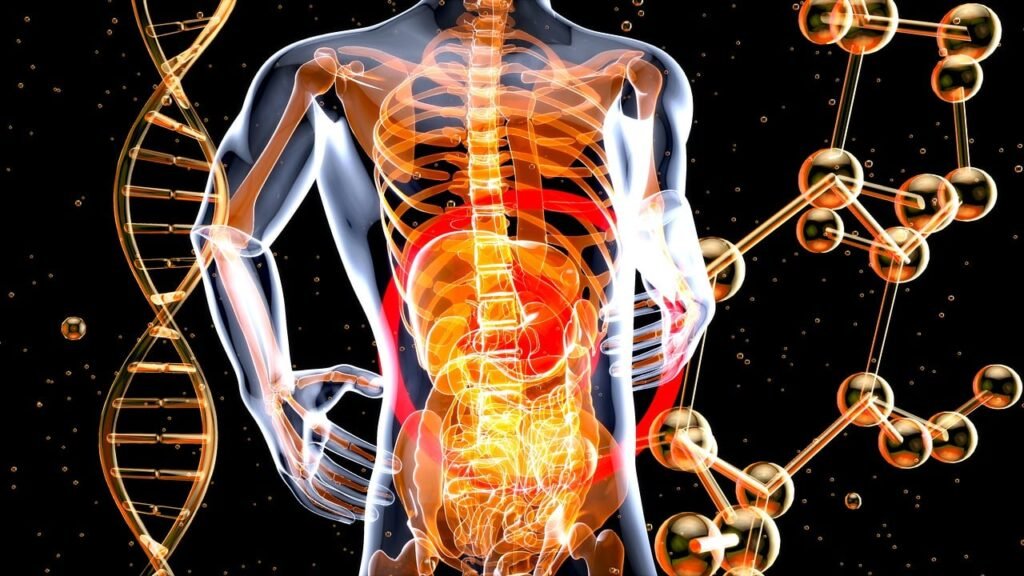Are you looking for a simple and effective way to improve your digestive health? Look no further than intermittent fasting. This increasingly popular eating pattern has been shown to provide numerous benefits for your digestive system. By giving your body a break from constant digestion, intermittent fasting allows your digestive system to rest and recover, leading to improved gut health, reduced inflammation, and increased nutrient absorption. In this article, we will explore the many ways in which intermittent fasting can positively impact your digestive health and provide you with practical tips to incorporate this eating pattern into your lifestyle. Get ready to discover a powerful tool for a healthier gut!
What is Intermittent Fasting
Definition and Overview
Intermittent fasting is a dietary approach that involves alternating periods of fasting and eating. Unlike traditional diets that focus on what you eat, intermittent fasting primarily focuses on when you eat. It involves restricting your eating window to a specific period of time, such as 8 hours, and fasting for the remaining 16 hours of the day. This pattern can be adjusted depending on your preferences and goals.
Different Types of Intermittent Fasting
There are several different types of intermittent fasting, each varying in the duration of the fasting and eating windows. Some popular methods include:
- 16/8 Method: This involves fasting for 16 hours and limiting your eating window to 8 hours. This is a common approach and can be easily incorporated into your daily routine.
- 5:2 Diet: With this method, you eat normally for 5 days of the week and restrict your calorie intake to 500-600 calories for the remaining 2 days.
- Eat-Stop-Eat: This method involves fasting for 24 hours once or twice a week. On fasting days, no solid food is consumed.
- Alternate-Day Fasting: As the name suggests, you fast every other day and eat normally on non-fasting days.
- Warrior Diet: This method involves fasting during the day and consuming one large meal at night.
Digestive Health and Intermittent Fasting
Improvement in Gut Function
Intermittent fasting has been found to improve gut function by giving the digestive system a break and allowing it to rest. During the fasting period, the digestive system has time to repair and regenerate, leading to improved overall digestive health. Additionally, fasting has been shown to increase the production of digestive enzymes, which aids in the breakdown and absorption of food.
Reduction in Inflammation
Chronic inflammation in the digestive system can contribute to a variety of digestive disorders. Intermittent fasting has been found to reduce inflammation in the gut, which can help alleviate symptoms of conditions such as irritable bowel syndrome (IBS), inflammatory bowel disease (IBD), and gastroesophageal reflux disease (GERD). By reducing inflammation, intermittent fasting may provide relief and improve overall digestive health.
Balancing Gut Microbiome
The gut microbiome plays a crucial role in digestive health. Intermittent fasting has been shown to positively influence the diversity and balance of gut bacteria, which can have a profound impact on digestion. A healthy gut microbiome is associated with reduced risk of digestive disorders and improved overall well-being. Incorporating intermittent fasting into your routine may help promote a healthy and balanced gut microbiome.

Effect of Intermittent Fasting on Digestive Disorders
Irritable Bowel Syndrome (IBS)
IBS is a common digestive disorder characterized by symptoms such as abdominal pain, bloating, and changes in bowel habits. Intermittent fasting can be beneficial for individuals with IBS as it provides the digestive system with a period of rest, reducing symptoms and improving overall gut health. However, it is important to consult with a healthcare professional before starting intermittent fasting, especially if you have any underlying health conditions.
Gastroesophageal Reflux Disease (GERD)
GERD is a chronic condition where stomach acid flows back into the esophagus, causing symptoms such as heartburn and acid reflux. Intermittent fasting has been shown to reduce symptoms of GERD by reducing inflammation and improving overall gut function. However, it is important to be mindful of your eating habits during the non-fasting periods, as certain foods can trigger acid reflux. It is recommended to avoid spicy, acidic, and fatty foods that can exacerbate symptoms.
Inflammatory Bowel Disease (IBD)
IBD encompasses conditions such as Crohn’s disease and ulcerative colitis, which are characterized by chronic inflammation of the gastrointestinal tract. Intermittent fasting has shown promise in reducing inflammation and alleviating symptoms in individuals with IBD. It is important to work closely with a healthcare professional and monitor your symptoms while incorporating intermittent fasting into your routine.
Mechanism behind the benefits
Reduced Oxidative Stress
Oxidative stress, which occurs when there is an imbalance between free radicals and antioxidants in the body, can contribute to digestive disorders. Intermittent fasting has been found to reduce oxidative stress by increasing the body’s natural antioxidant defenses. This can help protect the digestive system from damage and promote better overall gut health.
Enhanced Autophagy
Autophagy is a natural cellular recycling process that helps remove damaged cells and promote cellular regeneration. Intermittent fasting has been shown to enhance autophagy, which can aid in the removal of harmful substances and improve the overall function of the digestive system. By promoting autophagy, intermittent fasting may help prevent and alleviate digestive disorders.
Improved Insulin Sensitivity
Insulin resistance, a condition where cells become less responsive to insulin, is often associated with obesity and metabolic disorders. Intermittent fasting has been found to improve insulin sensitivity, which can help regulate blood sugar levels and prevent the development of digestive disorders such as diabetes. By improving insulin sensitivity, intermittent fasting may have a positive impact on digestive health.

Tips for Incorporating Intermittent Fasting
Start Slowly
If you’re new to intermittent fasting, it’s important to start slowly and gradually increase the fasting period. Begin with a 12-hour fasting window and gradually extend it to your desired fasting period. This allows your body to adjust and reduces the chances of experiencing hunger pangs or other discomforts.
Choose the Right Fasting Window
Finding the fasting window that works best for you is key. Experiment with different fasting and eating windows to determine what feels most sustainable and comfortable. Some people prefer to skip breakfast and have their first meal around noon, while others find it easier to fast overnight and have an early dinner. Listen to your body and choose a fasting window that aligns with your lifestyle and preferences.
Stay Hydrated
During the fasting period, it is important to stay hydrated. Drink plenty of water throughout the day to keep your body hydrated and help curb feelings of hunger. Herbal teas or black coffee without sweeteners or cream can also be consumed during the fasting period. However, it is important to avoid sugary beverages or any calorie-containing drinks, as they can break your fast.
Precautions and Considerations
Consultation with a Healthcare Professional
Before starting intermittent fasting, it is recommended to consult with a healthcare professional, especially if you have any underlying health conditions or are taking medications. They can provide guidance and ensure that intermittent fasting is appropriate for your individual circumstances.
Monitoring Nutrient Intake
While intermittent fasting can have numerous benefits for digestive health, it is important to ensure that you still meet your nutritional needs during the eating window. Focus on consuming a well-balanced diet that includes a variety of fruits, vegetables, whole grains, lean proteins, and healthy fats. Consider consulting a registered dietitian for personalized advice and to ensure you are meeting your nutrient requirements.
Potential Side Effects
Intermittent fasting may not be suitable for everyone and some individuals may experience side effects such as hunger, irritability, or changes in sleep patterns when first starting out. It is important to listen to your body and adjust your fasting routine accordingly. If you experience any severe or persistent side effects, it is recommended to discontinue intermittent fasting and consult with a healthcare professional.

Results from Scientific Studies
Study 1: Effects of Intermittent Fasting on Gut Microbiome
A study published in the journal Cell Research found that intermittent fasting can have a positive impact on the gut microbiome. The study showed that intermittent fasting increased the diversity and abundance of beneficial gut bacteria, while reducing the levels of harmful bacteria. These changes in the gut microbiome were associated with improved gut health and reduced risk of digestive disorders.
Study 2: Intermittent Fasting and Inflammatory Bowel Disease
A study conducted at the University of Illinois College of Medicine investigated the effect of intermittent fasting on inflammatory bowel disease (IBD) in mice. The study found that intermittent fasting significantly reduced inflammation in the gut and improved symptoms of IBD. The researchers attributed these benefits to the enhanced autophagy and reduced oxidative stress observed during fasting.
Study 3: Intermittent Fasting and GERD Symptoms
A study published in the Journal of Gastroenterology and Hepatology examined the effects of intermittent fasting on symptoms of gastroesophageal reflux disease (GERD). The study involved participants with GERD who followed an intermittent fasting protocol for 12 weeks. The results showed a significant reduction in GERD symptoms, with improvements in acid reflux and heartburn reported by the participants.
Success Stories and Testimonials
Case Study 1: How Intermittent Fasting Resolved Digestive Issues
Sarah, a 35-year-old woman, had been struggling with digestive issues and frequent episodes of bloating and abdominal pain. After consulting with a healthcare professional, she decided to try intermittent fasting. Within a few weeks of incorporating intermittent fasting into her routine, Sarah noticed a significant improvement in her symptoms. Her episodes of bloating reduced, and she experienced less discomfort overall. Sarah credits intermittent fasting for resolving her digestive issues and improving her overall gut health.
Case Study 2: Personal Experience and Improved Gut Health
John, a 42-year-old man, had been diagnosed with IBD and was struggling to manage his symptoms. After researching different approaches, he decided to give intermittent fasting a try. Over time, John noticed a reduction in inflammation and improvement in his IBD symptoms. He experienced fewer flare-ups and had a better quality of life. John attributes his improved gut health to the combination of intermittent fasting and medical treatment.
Testimonial 1: Overcoming Digestive Disorders with Intermittent Fasting
Emily, a 28-year-old woman, had been diagnosed with IBS and was constantly searching for ways to manage her symptoms. After trying various diets and medications, she stumbled upon intermittent fasting. Emily decided to give it a try and was pleasantly surprised by the results. Within a few weeks, her IBS symptoms decreased, and she felt more energized and in control of her digestive health. Emily now advocates for the benefits of intermittent fasting in managing digestive disorders.

Frequently Asked Questions
Can Intermittent Fasting Worsen Digestive Issues?
Intermittent fasting can have different effects on individuals with digestive issues. While some people may experience improvement in their symptoms, others may find that fasting worsens their digestive issues. It is important to listen to your body, consult with a healthcare professional, and monitor your symptoms closely when incorporating intermittent fasting. If you experience worsening of symptoms or discomfort, it may be necessary to adjust your fasting routine or consider other dietary approaches.
Is Intermittent Fasting Suitable for Everyone?
Intermittent fasting may not be suitable for everyone, especially those with certain health conditions or specific dietary needs. It is important to consult with a healthcare professional before starting intermittent fasting, especially if you have diabetes, are pregnant or breastfeeding, have a history of eating disorders, or are taking any medications that require regular meals. Your healthcare professional can provide personalized advice and help determine if intermittent fasting is appropriate for you.
What Should I Eat during Non-Fasting Periods?
During the non-fasting periods, it is important to focus on consuming a balanced and nutritious diet. Include a variety of fruits, vegetables, whole grains, lean proteins, and healthy fats. Avoid processed foods, sugary snacks, and excessive amounts of refined carbohydrates. Opt for nutrient-dense meals that provide essential vitamins, minerals, and fiber. It is also important to stay hydrated by drinking plenty of water throughout the day. Remember to listen to your body’s hunger and fullness cues and eat mindfully.

